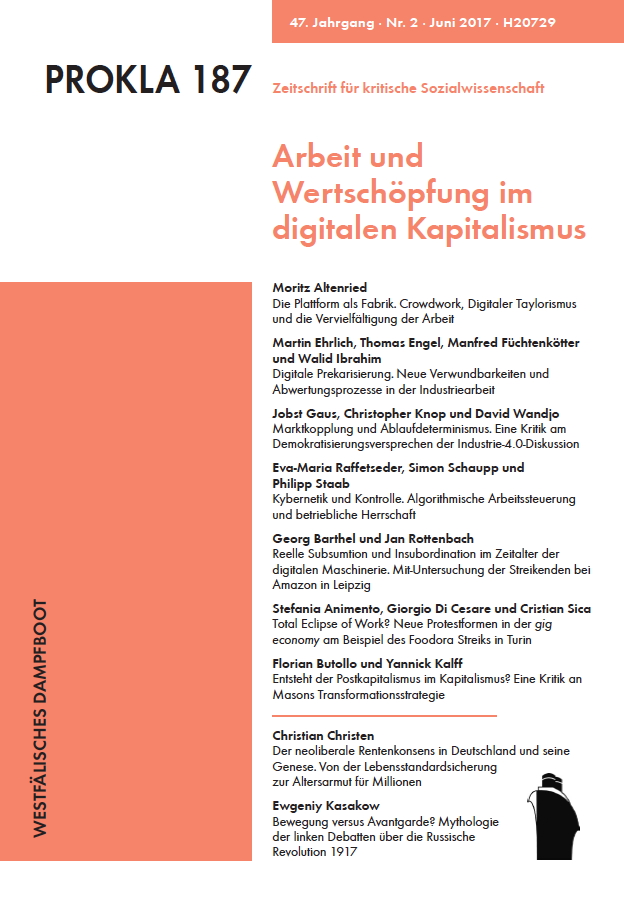Cybernetics and control
Algorithmic work control and domination in companies
DOI:
https://doi.org/10.32387/prokla.v47i187.143Keywords:
algorithm, control, digital capitalism, MonitoringAbstract
This paper analyses algorithmic control in labour processes as cybernetization of production. It starts from two empirical cases, the process management system Salesforce and sensor-based feedback systems for industrial production. In both cases, we conducted interviews with managers, developers and workers. From this basis, we argue that feedback-based cybernetic control constitutes a new quality of domination in the context of capitalist labour. The central vision put forward by the steering personnel interviewed by us is one of controlled self-organization of labour processes. This vision in turn is grounded on the elimination of cognitive planning and hierarchical order and therefore contrasted with human reflexivity on the level of the worker as well as the manager. Contrasting visions of cybernetic control with theories of reflexive action, we argue that cybernetics can be understood as the attempt to solve the “reflexivity problem” of modern control systems.
Downloads
References
Aneesh, Aneesh (2010): Globale Arbeit. Algokratische Formen der Organisation. In: Ruiz Ben, Esther (Hg.): Internationale Arbeitsräume. Unsicherheiten und Herausforderungen. Freiburg: 55-96. https://doi.org/10.1007/978-3-86226-419-3_3
Ashby, Ross (1957): An introduction to cybernetics. London. https://doi.org/10.5962/bhl.title.5851
Beer, Stafford (1959): Cybernetics and Management. London.
Boltanski, Luc (2008): Soziologie und Sozialkritik. Frankfurt/M.
Braverman, Harry (1998): Labor and Monopoly Capital. The Degradation of Work in the Twentieth Century. New York.
Burawoy, Michael (1979): Manufacturing Consent. Changes in the Labor Process under Monopoly Capitalism. Chicago.
De Certeau, Michel (2014): Kunst des Handelns. Berlin.
Deutschmann, Christoph (2001): Postindustrielle Industriesoziologie. Theoretische Grundlagen, Arbeitsverhältnisse und soziale Identitäten. Weinheim.
Edwards, Richard (1981): Herrschaft im modernen Produktionsprozess. Frankfurt/M-New York.
Friedman, Andrew L. (1977): Industry and Labour. Class Struggle at Work and Monopoly Capitalism. London. https://doi.org/10.1007/978-1-349-15845-4_3
Gerst, Detlef (2006): Von der direkten Kontrolle zur indirekten Steuerung. Eine empirische Untersuchung der Arbeitsfolgen teilautonomer Gruppenarbeit. München.
Giddens, Anthony (1997): Die Konstitution der Gesellschaft. Grundzüge einer Theorie der Strukturierung. Frankfurt/M-New York.
Marrs, Kira (2010): Herrschaft und Kontrolle in der Arbeit. In: Böhle, Fritz/Voß, Günther G./Wachtler, Günther (Hg.): Handbuch Arbeitssoziologie. Wiesbaden: 331-356. https://doi.org/10.1007/978-3-531-92247-8_11
Nachtwey, Oliver/Staab, Philipp (2015): Die Avantgarde des digitalen Kapitalismus. In: Mittelweg 36 24(6): 59-84.
Ōno, Taiichi (1988): Toyota production system. Beyond large-scale production. Portland/OR.
Pfeiffer, Sabine (2016): Warum reden wir eigentlich über Industrie 4.0? Auf dem Weg zum digitalen Despotismus. In: Mittelweg 36, 24 (6): 14-36.
Pohle, Jörg (2016): Transparenz und Berechenbarkeit vs. Autonomie- und Kontrollverlust. Die Industrialisierung der gesellschaftlichen Informationsverarbeitung und ihre Folgen. In: Degeling, Martin/Püschel, Florian/Schauerte, Eva: Mediale Kontrolle unter Beobachtung. Privatheit und Quantifizierbarkeit 5.1(2016). URL: medialekontrolle.de/ausgaben/5-1-2016-privatheit-und-quantifizierbarkeit, Zugriff: 14.1.2017.
Sauer, Dieter (2011): Indirekte Steuerung. Zum Formwandel betrieblicher Herrschaft. In: Bonß, Wolfgang/ Lau, Christoph (Hrsg.): Macht und Herrschaft in der reflexiven Moderne. Weilerswist: 358-379. https://doi.org/10.1007/978-3-531-93469-3_18
Schaupp, Simon (2016): Digitale Selbstüberwachung. Self-Tracking im kybernetischen Kapitalismus. Heidelberg.
- (2017): Vergessene Horizonte. Der kybernetische Kapitalismus und seine Alternativen. In: Buckermann, Paul/Koppenburger, Anne/Schaupp, Simon (Hg.): Kybernetik, Kapitalismus, Revolutionen. Emanzipatorische Perspektiven im technologischen Wandel. Münster: 51-73.
Schütt, Petra/ Pfeiffer, Sabine/ Ritter, Tobias (2015): Organisationales Arbeitsvermögen. Eine wichtige Dimension für die nachhaltige Integration in eine Arbeitsorganisation. In: forum arbeit - Zeitschrift der Bundesarbeitsgemeinschaft Arbeit, Heft 4: 10-16.
Staab, Philipp (2014): Die Metamorphosen der Fabriksozialisation. Zur Produktion des Arbeiters in Vergangenheit und Gegenwart. In: Mittelweg 36 23(6): 4-27.
- (2016): Falsche Versprechen. Wachstum im digitalen Kapitalismus. Hamburg.
Wiener, Norbert (1948): Cybernetics. Control and communication in the animal and the machine. New York.






